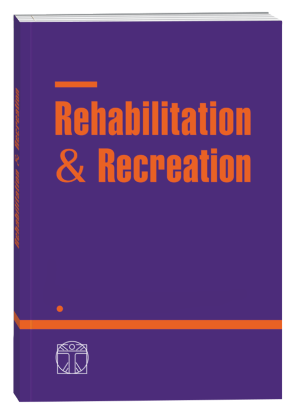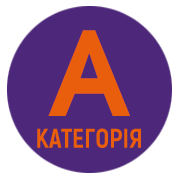THE EFFECT OF PHYSICAL THERAPY ON IMPROVING THE PSYCHOEMOTIONAL STATE OF PATIENTS WITH RHEUMATOID ARTHRITIS
DOI:
https://doi.org/10.32782/2522-1795.2023.16.9Keywords:
rheumatoid arthritis, psycho-emotional state, anxiety, depression, physical therapy.Abstract
The article presents data on the prevalence of rheumatoid arthritis. It has been established that the high incidence of the disease among people of working age and the rapid disability of patients represent a serious medical and social problem and cause huge economic costs. It has been shown that the chronic, progressive process of the disease leads to the formation of psycho-emotional disorders in patients, which negatively affect the quality of their lives. The purpose of the paper was to evaluate the effectiveness of physical therapy on the psychoemotional state of patients with rheumatoid arthritis. Material and methods: 188 patients with rheumatoid arthritis were examined, including 156 women (83 %) and 32 men (17 %), with an average age of 45 years. All patients were randomly assigned to the control (n = 92) and intervention (n = 96) groups. In order to assess the effectiveness of physical therapy on the psychoemotional state of patients with rheumatoid arthritis, we conducted a questionnaire using the Hospital Anxiety and Depression Scale (HADS). Results. The rehabilitation techniques included therapeutic exercises, therapeutic massage, self-massage, orthotics, physiotherapy, hydrotherapy, kinesiotaping, and mechanotherapy. Psychological support was provided to patients, including autogenic training and positive psychotherapy. The initial examination showed that the majority of patients with rheumatoid arthritis have psycho-emotional disorders of anxiety and depression – 86 %, which confirms the data of various authors. The presented results of anxiety and depressive syndrome in patients with rheumatoid arthritis 3 months after the start of physical therapy/rehabilitation showed a decrease in the level of anxiety and depression according to the HADS scale in the study groups. At the same time, in patients of the main group, the changes were more pronounced than in patients of the control group, where these indicators were significantly higher. The analysis of the indicators of anxiety and depression syndrome according to the HADS questionnaire after 6 months of rehabilitation measures showed a significant improvement in the main group patients. Thus, the absence of anxiety symptoms was observed in a much larger number of patients in the main group – 62.5 % of patients, with no symptoms of depression – 68.7 % of patients; in the control group, there were much fewer such cases: 41.3 % of patients with no anxiety symptoms, and 53.3 % of patients with no symptoms of depression. Conclusions. The effectiveness of the developed technology of rehabilitation measures is confirmed by a significant improvement in the HADS scale in patients of the main group, in contrast to the control group, which was significantly worse.
References
Ногас А.О. Оцінка функціональних порушень верхніх кінцівок у хворих на ревматоїдний артрит. Український журнал медицини, біології та спорту. 2023. № 8(1). С. 57–58. doi: 10.26693/jmbs08.01.208
Коритко З.І., Поник Р.М., Купріненко О.В. Вплив засобів фізичної реабілітації на якість життя хворих при ревматоїдному артриті. Експериментальна та клінічна фізіологія і біохімія. 2019. № 4(88). С. 45–52.
Ногас А.О. Оцінка функції руки у пацієнтів із ревматоїдним артритом у результаті застосування фізичної терапії. Art of Medicine. 2023. № 2(26). С. 98–103. doi: 10.21802/ artm.2023.2.26.98
Ногас А.О. Ефективність застосування реабілітаційних заходів для відновлення функції суглобів у пацієнтів з ревматоїдним артритом. Реабілітаційні та фізкультурно- рекреаційні аспекти розвитку людини (Rehabilitation & recreation). 2023. № 14. С. 71–81. doi: 10.32782/2522-1795.2023.14.8
Курята О.В., Сіренко О.Ю., Лисунець Т.К. Біль у суглобах у хворих ревматологічного профілю: роль контролю тривожно-депресивних розладів. Український ревматологічний журнал. 2017. № 2(68). С. 52–57.
Ногас А.О. Покращення якості життя хворих на ревматоїдний артрит за допомогою фізичної активності. Реабілітаційні та фізкультурно-рекреаційні аспекти розвитку людини (Rehabilitation & recreation). 2022. № 13. С. 48–53. doi: 10.32782/2522- 1795.2022.13.6 7. Ніколенко А.Є. Психоемоційні розлади у хворих на ревматоїдний артрит: результати дослідження. PMGP. № 11. Травень 2019. С. 0401185.
Сікало Ю.К., Станіславчук М.А. Психоемоційні розлади у хворих на ревматоїдний артрит та корекція їх пароксетином. Український ревматологічний журнал. 2014. № 57(3). С. 54–58.
Ногас А.О., Карпінський А.Ю. Рухова активність у фізичній реабілітації хворих на ревматоїдний артрит. Молодіжний науковий вісник Східноєвропейського національного університету імені Лесі Українки. 2017. № 1(37). С. 130–135. doi: 10.29038/2220-7481- 2017-01-130-135
Amal Ali Hassan, Mona Hamdy Nasr, Ahmed Lotfi Mohamed, Ahmed Mustafa Kamal and Alyaa Diaa Elmoghazy.. Psychological affection in rheumatoid arthritis patients in relation to disease activity. Medicine (Baltimore). 2019. May. Vol. 98(19). P. 15373. doi: 10.1097/MD.0000000000015373
Григус І.М., Ногас А.О. Комплексний аналіз больового синдрому у пацієнтів на ревматоїдний артрит. Медичні перспективи. 2023. № 28(1). С. 148–152. doi: 10.26641/ 2307-0404.2023.1.276049
Zhang C., Wu X., Yuan Y., Xiao H., Li E., Ke H., Yang M., Zhu X. and Zhang Z. Effect of solution-focused approach on anxiety and depression in patients with rheumatoid arthritis: A quasi-experimental study. Front. Psychol. 2022. № 13. Р. 939586. doi: 10.3389/ fpsyg.2022.939586
Кривенко В.І., Федорова О.П., Непрядкіна І.В. та ін. Основні ревматичні захворювання в практиці лікаря загальної практики – сімейної медицини : навчальний посібник для лікарів, лікарів-інтернів за фахом «Загальна практика – сімейна медицина» та «Внутрішні хвороби». Запоріжжя, 2020. 142 с.
Zigmond A.S., Snaith R.P. The Hospital Anxiety and Depression scale. Acta Psychiatr. Scand. 1983. № 67. С. 361–370.
Наказ МОЗ України від 11.04.2014 р. № 263. Ревматоїдний артрит: адаптована клінічна настанова, заснована на доказах. URL: www.moz.gov.ua.
Downloads
Published
How to Cite
Issue
Section
License

This work is licensed under a Creative Commons Attribution-NonCommercial-NoDerivatives 4.0 International License.












